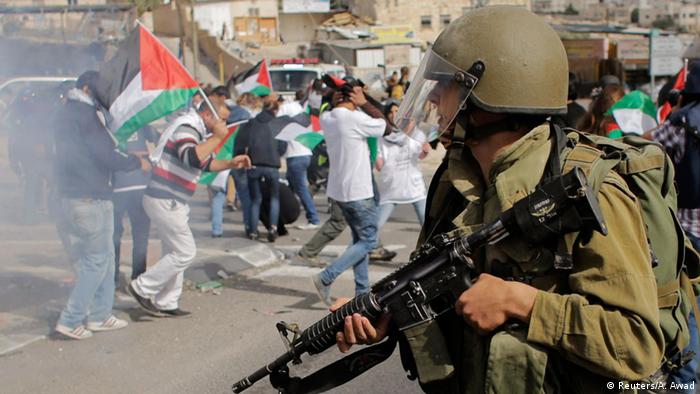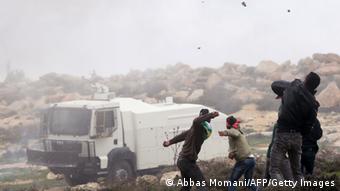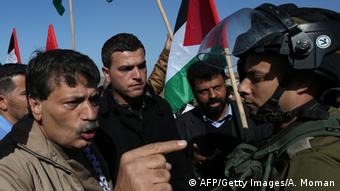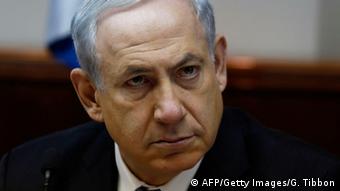Israeli-Palestinian bilateral relations have reached a low point. On both sides, aggression and violence are on the rise. The hardliners, in particular, benefit - those who place ideology above everything else.
Israel has been discussing the case of one of its citizens turned jihadist. Two months ago, the adolescent Israeli with Palestinian roots had run away from home and couldn't be traced. Now he has emerged again, in a Turkish hospital where doctors attended to his severe burns. It is believed that he contracted them in Syria or Iraq, having joined the ranks of the "Islamic State" terrorist organization.
The case of the young jihadist is exacerbating fears of religious extremism in Israel. Could it be possible that more and more Palestinians are joining radical jihadist groups such as IS? In November, IS confirmed its presence in the Gaza Strip. Hamas' own Islamists, who are in control of the enclosed coastal strip, so far have denied the presence of IS fighters, not even changing their position when - also at the beginning of November - the French Cultural Center in Gaza City came under attack and "Islamic State" claimed responsibility.
Thus far, Hamas has avoided a categorical condemnation of IS activity in Syria and Iraq. "We have decided not to comment on IS," a Hamas security officer told the internet magazine Al-Monitor: "We are all Islamists, and for ideological reasons, it is difficult for us to condemn them as terrorists, given that we ourselves are also accused of terrorism by the West and by some Arab states."
Ideological battle
Hamas is increasingly trying to export its Islamist ideology into the West Bank, where the secular Fatah is in power. Hamas must bring armed resistance into every inch of the West Bank, Al-Monitor quotes Hamas leader Mahmoud al-Zahar as saying during a public speech in Gaza at the end of November 2014. Alarmed, the Palestinian Authority responded by arresting over 200 militant Hamas activists in November alone.
The arrests point to a dispute currently dividing Palestinians, despite having installed a Palestinian unity government made up of Hamas and Fatah members in the spring. Hamas and Fatah disagree over the right policy towards Israel, having reached agreement only with respect to condemning the general outline of Israel's approach. For example, both sides claim that Israel is responsible for the death of Palestinian politician Ziad Abu Ein, who was killed in the course of protests in the north of Ramallah on December 10th, 2014. While serving in the unity government as a minister without a specific portfolio, Abu Ein died in the wake of a violent clash with Israeli soldiers.
Abu Ein's death is fueling Palestinians' anger as much as the killing of 19-year-old Muhammad Jawabreh, who was shot by Israeli soldiers during a demonstration on November 11th.
Palestinians turn to UN Security Council
Palestinians are now determined to refer any such incidents to the Security Council, along with continued Israeli settlement construction and Israeli military acts in the Gaza war during the summer of 2014. Likewise, they complain of an increasing propensity for violence among Jewish extremists, both in Israel and in the Palestinian territories.
Recently, they submitted a resolution with the stated aim of promoting a durable peace settlement with Israel. "We are doing this after many years of suffering from murder, destruction, bombs, artillery fire, trickery, hypocrisy and the extension of settlements," read a column on Tuesday in the Palestinian daily newspaper "Hayat al-jadida." On the same day, East Jerusalem's "Al Quds" newspaper claimed that the whole world recognized that Israel was a stumbling block to peace.
Standstill until Israeli elections?
Israel, for its part, accuses the Palestinians of torpedoing peace efforts. An author in the "Jerusalem Post" newspaper argues that Palestinians tried to undermine the "two states for two peoples" principle during every round of negotiation. The left-wing "Haaretz" adopts a different tone, with writer Gershom Gorenberg arguing in his commentary that Prime Minister Netanyahu is to blame for a feeling of insecurity among Israelis and their anxiety about the future.
Netanyahu will seek re-election on March 17th, 2015, and he is expected to present himself as a veteran politician during the election campaign. "[He has] great experience - at building settlements, transferring wealth to the wealthy, rabble-rousing from one side of his mouth and sounding smoothly moderate from the other," writes Gorenberg. Netanyahu wanted to come across as a strong leader protecting his people, writes journalist Ben Caspit in "Al-Monitor," but in the eyes of the Israeli people, Caspit says he has lost credibility. Caspit argues that the fact that it took the Israeli military 50 days last summer to defeat Hamas caused many voters to view Netanyahu's security pledges as implausible.
The possible outbreak of a new insurgence dominates the discussion on both sides - also because during recent months they have not been able to make a single step towards each other. In all likelihood, the status quo will prevail until the March elections - even if this situation isn't especially conducive to peace. Violent incidents have become more frequent during recent months. There is little to suggest they will be fewer in number in the days to come.





No comments:
Post a Comment